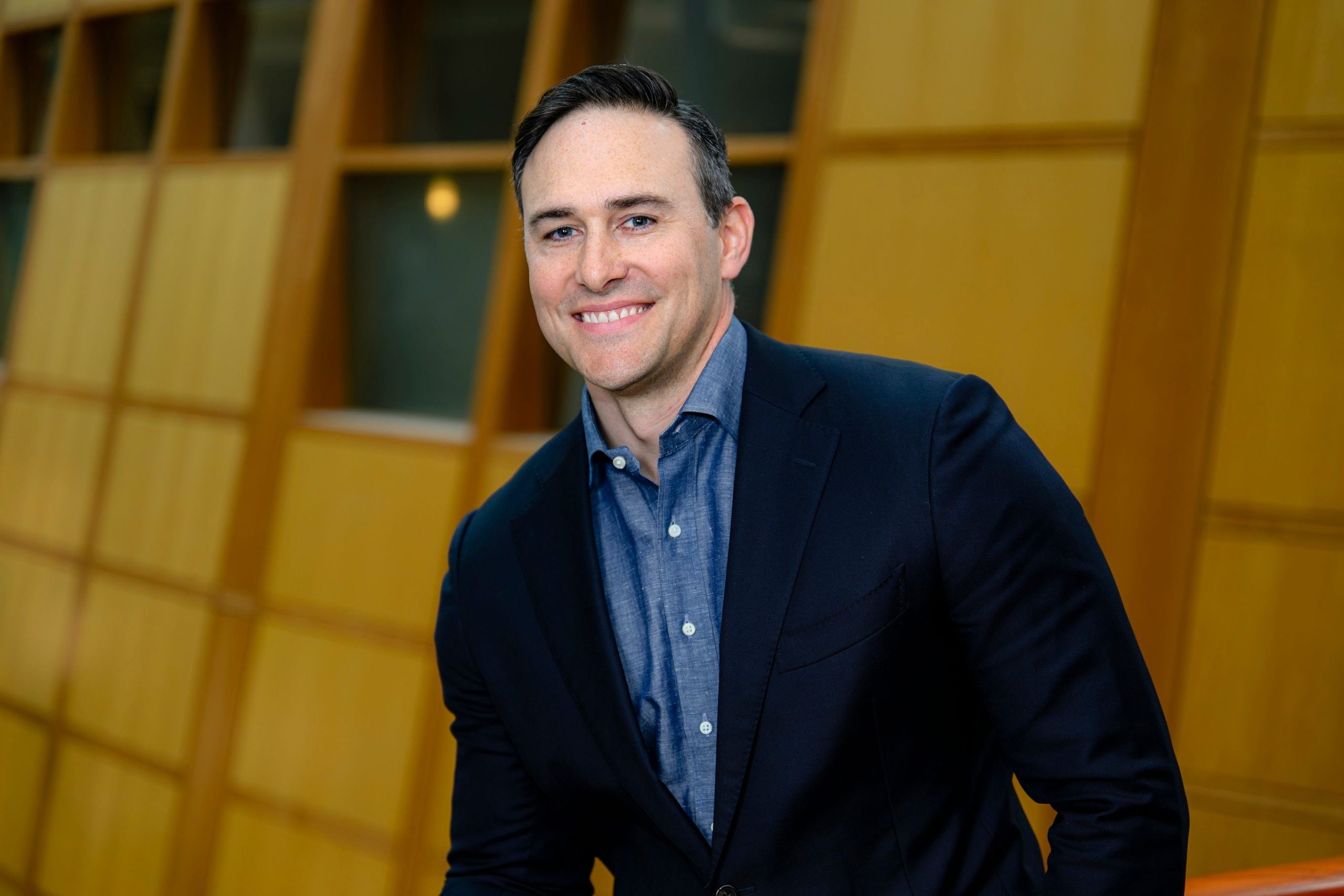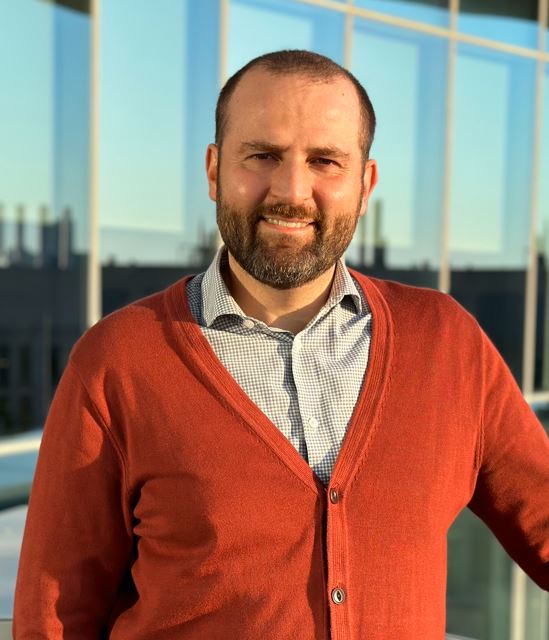
Adam Lair, Georgetown University (McDonough)
Myth: It won’t be worth it.
Reality: “It seemed like some variation of that idea was everywhere during my program, but it couldn’t have been farther from the truth in my experience. Not only did we learn invaluable tools from some of the best professors in the country, but a number of students in my cohort (including myself) received promotions or found their ideal jobs during our program. I’m often asked if I’m glad I made the decision to go back to business school, and the answer is absolutely.”
Adam Lair, Georgetown University (McDonough)
Myth: You can’t work full-time and go to school. You’ll have to give up your current responsibilities.
Reality: “This was very different from what I experienced. The University of Michigan Ross School of Business’ Executive MBA program was designed for working professionals. I traveled 42 weeks for business in 2021 then welcomed a daughter, changed jobs, moved states in 2022 – all well attending school. With the support of my classmates, my employer, and the tailored Executive MBA program, I was able to successfully balance life, work, and school.”
Peter Evans, University of Michigan (Ross)
Reality: “The biggest myth about going back to school is that it is impossible to juggle while working in a demanding job and having young kids at home. The truth is that in pursuing an important building block, you will learn to ask for help and prioritize your commitments. At work, you will learn to delegate effectively, trust your team and communicate effectively. At home your hard work, perseverance and commitment will be a wonderful example for your children, and you will be a role model for your whole family. Since I started the executive MBA program, I noticed that at work, my confidence and efficiency has improved. Best of all, at home, my kids are more independent and take the initiative to study daily and do their homework. I believe the reason my children are more independently motivated is partly because they see me study daily, face the challenge of learning new things, and not give up even when times are tough. This was a benefit that I never envisaged and will be a life-long lesson for them.”
Lara Adesokan, Rice University (Jones)

Will Giordano-Perez, IE-Brown
Reality: “The reality is that you surely can’t do it all, all of the time. You learn how to prioritize those commitments that matter most to you, the ones that “feed your soul” and give you purpose. It took me a little while to learn this before I began shedding some responsibilities that were no longer serving me. Many of the work responsibilities that I carried at the start of the program were the result of poor management and this program helped me to recognize that and provided me with tools to change the situation. This EMBA offers incredible flexibility in schedules allowing students to blend their studies with work, family, and other responsibilities.”
Wilfredo Giordano-Perez, IE Brown Executive MBA
Myth: You’re going to get exposed and embarrassed.
Reality: “When starting an MBA, many people (myself included) are worried about exposing their knowledge gaps to their peers. It was refreshing to see how open people are to learning new skills and focusing on their development needs rather than purely relying on their strengths. It is really important to have a growth mindset.
Johnny Scarlett, London Business School
Reality: “Coming from a less-traditional background from the non-profit sector, I struggled initially with imposter syndrome. We bonded closely as a cohort, and it was important to share together that collective vulnerability in undertaking this journey. That’s what makes it special. The trust and bond of the cohort. Even the most intimidating high-flyers feel nerves and anxiety getting back into the swing of structuring academic essays and reports, or presenting in class. There is real strength in the community of the peer group to support each other.”
Eleanor Hevey, University of Oxford (Said)
Myth: You’re too old for an MBA.
Reality: “The reality is that there’s never a wrong time to return to school. Society, government, and business are changing at unprecedented speed. If you’re not advancing your knowledge, you’re simply falling behind. I was excited by Wharton for its heavy quantitative and data driven approach but was equally nervous after a career spent with words. That said, it’s all entirely do-able, your classmates will be critical allies, and there’s no point going back to school if you’re not going to be stretched.”
Kunal Khatri, Wharton School
Myth: Going back to school is like picking up an extra hobby or side gig.
Reality: “I thought a couple hours during the week and some occasional class weekends was the extent of a part-time program. This couldn’t have been further from the truth. Not only was the work rigorous and time-consuming but I genuinely loved the material I was learning and the people I was learning it with. I wanted to take every elective and join every social club and talk about the decisions of leaders I read about in my classes. I found myself craving the academic environment and intellectual stimulation beyond my job. Going back to school was more than just taking some classes in the field of business administration. It changed my outlook on life, how I allocate my time and the vision I have of where I want my personal and professional life to go.”
Deidra Willis, UCLA (Anderson)

Volkan Emre, Northwestern University (Kellogg)
Reality: “There is a myth that executive MBA programs are less intensive than a full-time MBA program. In my view and experience, this is entirely untrue and here’s why:
First, EMBA students are accomplished and impactful business leaders who work full-time. It is incredibly challenging for working professionals to incorporate Kellogg into their busy schedules. I traveled from St. Paul, MN, to Evanston, IL, twice a month and spent an average of six days per month on campus. In addition, I dedicated nearly eight weeks to intensive weeks and international electives. From a time commitment perspective, I believe that being in a competitive executive MBA program is equally as, and sometimes more, demanding as a full-time MBA program, perhaps just in a different way.
Competitive executive MBA programs attract the best and brightest accomplished business professionals. When it comes to group work and assignments, EMBA participants typically bring their passion and skill set to the table. This ultimately pushes all group members to work harder to meet each other’s expectations. As the bar is high, so are the levels of commitment and quality of work.
Lastly, both programs share the same professors, and I do not believe they are more lenient towards executive MBA students.”
Volkan Emre, Northwestern University (Kellogg)
Myth: If you’re already well-established in your career, you don’t need a graduate degree to advance professionally.
Reality: “Pursuing the Cornell Executive MBA was a gratifying experience that provides numerous professional and personal growth benefits even better than I expected at the onset. Although a graduate degree may not guarantee a higher salary or a better job, it impacts your career trajectory in a number of critical ways such as the following:
Expand Your Professional Network: One of the most significant benefits of an MBA program is connecting with a diverse group of professionals, including classmates, faculty, alumni, and guest speakers. These connections can help you broaden your perspective, gain industry insights, and form partnerships, which can be invaluable as you advance in your career.
Provides New Opportunities: The Cornell MBA program helped me pivot into a new organizational role. This experience signaled my dedication to learning and professional development, making me an attractive candidate for the promotion I received. Additionally, the program exposed me to innovative ideas and concepts that will ripple throughout my organization.
Personal Growth and Transformation: An MBA program challenges you to think critically, adapt quickly to new situations, and develop a deeper understanding of your strengths and weaknesses. This self-awareness leads to personal growth and transformation, making me a better leader and a more well-rounded individual.
Enhanced Credibility and Personal Brand: Possessing an MBA from two highly respected institutions bolsters my credibility and personal brand in the business world. These credentials give me a competitive edge and demonstrate my commitment to excellence.
While an EMBA may not provide the immediate return on investment in the form of a higher salary or better job, the long-term benefits of enhanced skills, an expanded professional network, and new learning opportunities make it a valuable asset for professionals seeking career growth.”
Corey R. Bailey, Cornell University (Johnson)
DON’T MISS:
THE BEST & BRIGHTEST EXECUTIVE MBAS OF 2023





Questions about this article? Email us or leave a comment below.